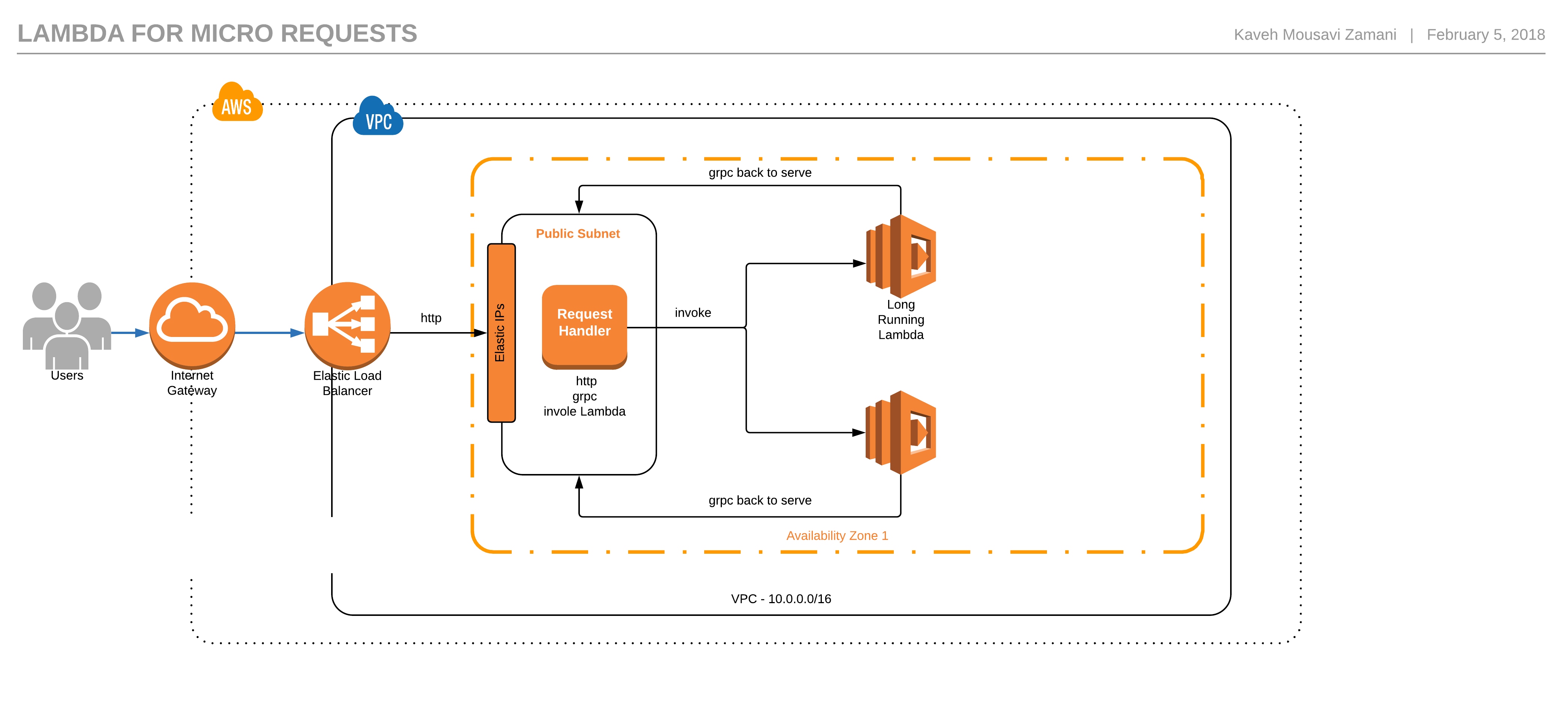Jobber is an idea and a sample implementation to use AWS Lambda functions for micro requests
- Past: Dealing with rigid bare-metal servers. minimum granularity : -
- Recently - Setting up an auto-scaling environment, using Kubernetes or other tools. Scaling up and down based on incoming requersts. minimum granularity : one VM
- Today - Using Lambda or Google functions we can scale up to 10,000 cpu in few seconds and then scale down to nothing. minimum granularity: one core, 128MB ram
For both AWS Lambda and Google cloud functions there are two catches. They have high startup time, near 10ms, and they have minimum 100ms time granularity.
It means if I want to serve my http requests that take 12ms, first I will face near 10ms delay just to start the function, then both platforms will charge me for 100ms of time, even though I just needed 12ms. This makes Cloud function not suitable for normal usage.
Here will eliminate both issues.
The idea is to invoke a Lambda function but instead of asking it to do one request we will keep it around to serve many more with sub microsecond delay. And because it will serve many requests we might not care about 100s time granularity neither.
Method is easy. But you need to know about gRPC and its bidirectional connection. Both very simple concepts.
We create a http server and also a gRPC server. When we have traffic we invoke one or more Lambda functions.
Those Lambda functions create a bidirectional connection to our gRPC server which is running along with http server.
Lambda functions wont after one request. They stay to get and serve many requests with sub microsecond delay from now on.
Now http server relays the load to Lambda functions through gRPC and gets the result back.
We just need a mechanism to invoke enough Lambda function to handle our traffic. And when traffic is low to stop them.
This repository has one sample implementation to show the concept.
Solution does not depend on these, but I picked gRPC as RPC framework and protobuf as data interchange format and Go to implement it.
Protobuf is a simple format.
Payload definition is at payload/payload.proto.
If you are gonna encode/decode your data what is there is enough, otherwise edit payload.proto and regenereate the go file.
To invoke Lambda function you need to pass the scheduler to NewJobber.
I implemented to scheduler.
- goroutine.Goroutine: a dummy scheduler which is there only for test purposes.
- awslambda.LambdaScheduler: A simple scheduler which can invoke a lambda function to send the jobs to it.
s := gRPC.NewServer()
taskMachine = jobber.NewJobber(jobber.Scheduler(&goroutine.Goroutine{GrpcHost: "localhost:50051"}))
taskMachine.RegisterGRPC(s)Scheduler need to implements the following inteface:
interface {
// Inbound is called before a new task is added.
Inbound()
// Done is called when a task is done
Done()
// Timedout is called when no response was received on time for a task
Timedout()
}This solution does not depend on protobuf, gRPC or aws lambda but in this implementation I picked those tools,
example includes a dummy test case and also an example of using lamba scheduler.
just to see how it all works simply do the following
In one terminal run the example
$go run example/goroutine/main.go
2018/02/11 14:48:57 Start listening gRPC at 50051
2018/02/11 14:49:17 minion: job inbound 0 0
2018/02/11 14:49:17 worker[1]: Hi, I was invoked and I am trying to connect to accept jobs
2018/02/11 14:49:17 worker[1]: I Joined the workforce
2018/02/11 14:49:17 server: A new minion joined to help
2018/02/11 14:49:17 server: got a job
2018/02/11 14:49:17 worker[1]: received a task from server data:"This is the payload I will send to Lambda."
2018/02/11 14:49:18 worker[1]: task is done
2018/02/11 14:49:18 server: received the response
2018/02/11 14:49:18 server: send the response
2018/02/11 14:49:18 server: send the response back to client
2018/02/11 14:49:18 minion: job done
2018/02/11 14:49:18 Example: received data:"2018-02-11 14:49:18.623911211 +0100 CET m=+21.589500545" <nil>In another terminal send a request
$ curl 'http://localhost:8000/'
2018-02-11 14:49:18.623911211 +0100 CET m=+21.589500545
In the code, your request goes to http server. Your handler will call Do and wait for response. Managing Lambda functions and sending and receiving message is done by jobber
resp, err := myJobber.Do(&payload.Task{Data: "This is the payload I will send to Lambda."})
if err != nil {
resp = &payload.Result{Data: "Because of error result was returned as nil"}
}
log.Println("Example: received", resp, err)
fmt.Fprint(w, resp.Data)If you are familiar with Lambda function, setting up one is easy.
But notice lambda functions need to connect back you the gRPC server which Jobber depends on. So they must be in the same network (VPC), or somehow they need to have access you your gRPC port.
You can see an example at example/lambda and a sample Lambda function which does nothing at example/aws_func.
